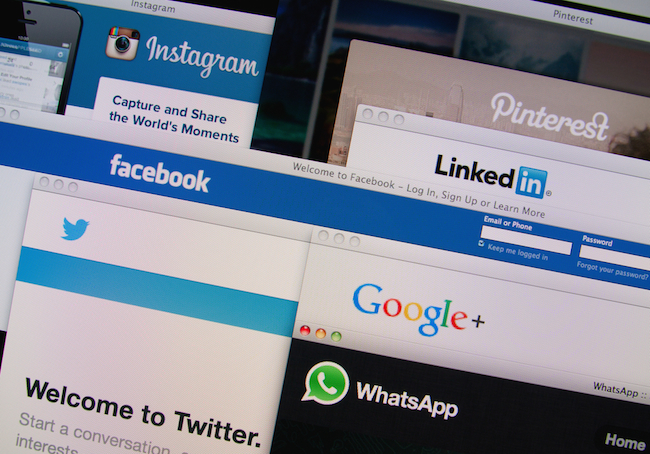Stressed Out? Social Media May Help Women Cope

Face it, ladies: your DIY projects rarely turn out like the ones you see on Pinterest, and your Facebook posts aren't universally "liked." But a new survey suggests that despite such woes, social networking is still good for you.
The survey found that women who frequently use social media, along with other technologies, to connect with friends and family report feeling less stressed than women who connect less often.
The researchers at Rutgers University in New Jersey and the Pew Research Center in Washington, D.C., found that women who frequently email, text and use social media scored 21 percent lower on a test that measures stress than women who don't use these technologies. [Photo Future: 7 High-Tech Ways to Share Images]
The survey's findings add a new dimension to discussions about the psychological effects of social media. In recent years, frequent use of sites like Facebook and Twitter has been linked to a host of negative outcomes — from narcissist personality disorder to self-destructive behavior. Some attention has also been paid to the connection between social media and stress, with articles in the Huffington Post and Psych Central linking use of social media sites with higher levels of stress and anxiety.
However, claims that social media and other technologies increase stress aren't well supported by scientific data, said Keith Hampton, an associate professor of communications at Rutgers and lead author of the new survey.
"We were interested in testing the common assumption that social media use — or the use of the Internet or mobile technology — is related to stress," Hampton told Live Science. "The way that most [researchers] have done this in the past is to ask people if they feel stressed when they use Facebook. But it's difficult to compare an answer to that question to answers from people who don't use this technology, or use it less."
To get a clearer picture of how stress and social media are related, Hampton and his fellow researchers asked about 1,800 people to complete the Perceived Stress Scale (PSS), a widely used instrument for measuring how people perceive stress in their daily lives. The PSS doesn't measure whether or not certain technologies cause stress; it just asks general questions about the stress that someone has felt over the past month.
Sign up for the Live Science daily newsletter now
Get the world’s most fascinating discoveries delivered straight to your inbox.
After completing the PSS, participants completed another survey related to their use of digital technologies and social media. They were asked which technologies they used and how often, as well as questions related to how many friends or followers they had in different social networks.
"What we found was that, for most people, there's no relationship between how much they use these technologies or how many Facebook friends they have and their stress," Hampton said. The only exception was for women who use these social technologies compared to those who don't, he added.
The cost of caring
The researchers didn't find evidence to support the popular hypothesis that we'd all be less stressed out if we quit Facebook and stopped responding to email. However, they did find that sometimes, when the conditions are right, the use of certain technologies can lead to higher levels of stress — especially for women.
Although the women who frequently used technology generally had lower stress levels, they were still much more aware of stressful events that occur in the lives of close friends and acquaintances than people who rarely or never use digital technology, the survey found. For example, technology users are more likely to know if someone in their circle has lost a child or a spouse, if a friend got a divorce or if a former co-worker lost his job.
"Other researchers have previously found that when you know about unfortunate things happening to your friends and family [members], it results in more stress for you. In that way, stress is contagious," Hampton said.
Social media and other digital technologies are designed to keep people up to speed on what's going on in other peoples' lives, including these kinds of stressful events. People who use these technologies more are therefore more likely to "catch" stress from others than people who don't use social technologies, Hampton said. [11 Tips to Lower Stress]
"And women are much more aware of the stressful things that are happening in other peoples' lives [than men are], which makes them much more susceptible to that kind of contagious stress," Hampton said.
The researchers found that four stress-inducing events in the lives of others can cause women to report higher levels of stress in their own lives. Women who were aware that someone close to them had experienced the death of a child, partner or spouse scored 14 percent higher on the PSS, for example. And women who knew that a close friend was seriously injured reported 5 percent higher stress in their own lives. Women who knew someone who had been accused of or arrested for a crime, or someone who had been demoted at work, also scored higher on the PSS.
Only two stressful events in the lives of others predicted higher levels of stress in men. Men who had close friends or family members accused of or arrested for a crime scored 15 percent higher on the PSS. Those who had an acquaintance who got demoted at work reported 12 percent higher stress.
The higher incidence of stress among the subset of technology users who are aware of stressful events in the lives of others is something that Hampton and his colleagues call "the cost of caring."
"You can use these technologies and, as a woman, it's probably going to be beneficial for your level of stress. But every now and then, bad things are going to happen to people you know, and there's going to be a cost for that," Hampton said.
Lee Rainie, the director of Internet, science and technology research at Pew Research Center, put it a bit differently.
"This is the ultimate story of technology. There are enormous benefits that come from it, and sometimes there are really significant social costs," Rainie told Live Science. "It's never either/or, never good or bad entirely."
The full report outlining the survey results can be accessed online at the Pew Research Center's Internet Project homepage.
Follow Elizabeth Palermo @techEpalermo. Follow Live Science @livescience, Facebook & Google+. Original article on Live Science.

Elizabeth is a former Live Science associate editor and current director of audience development at the Chamber of Commerce. She graduated with a bachelor of arts degree from George Washington University. Elizabeth has traveled throughout the Americas, studying political systems and indigenous cultures and teaching English to students of all ages.
Crop circles surround Iraq's multicolored 'Sea of Salt' after years of drought — Earth from space
Watch humanlike robot with bionic muscles dangle as it twitches, shrugs and clenches its fists in creepy video
'The parasite was in the driver's seat': The zombie ants that die gruesome deaths fit for a horror movie










